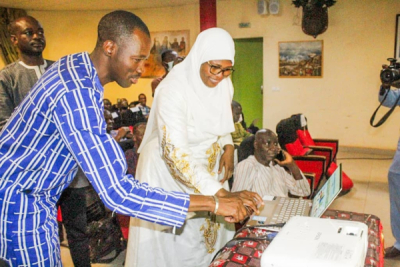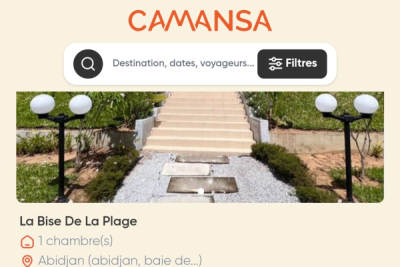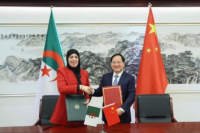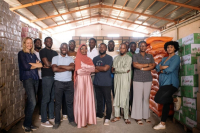In an effort to help people maintain a digital medical record, three tech entrepreneurs have developed a solution using blockchain and artificial intelligence (AI).
Myrekod, an e-health solution developed by Kenyan startup Afya Rekod, offers users the ability to store their personal medical records and access healthcare services. Founded in 2020 by Ronald Harris, John Kamara, and Irene Kiwia, this Nairobi-based startup leverages blockchain technology and integrates AI to empower patients.
The application connects users to the healthcare ecosystem, including hospitals, pharmacies, and insurance providers. In February 2022, Afya Rekod secured $2 million in funding to support its growth across the continent. Commenting on the fundraising, John Kamara, co-founder of Afya Rekod, said it would “give patients resources and tools to store and manage their health data, a critical function for patients with chronic illnesses, and their doctors.”
“For the past one and a half years, we've singularly focused on building a dynamic platform that streamlines health records with analytics and provides access to specialized clinics and experts. This delivers high quality healthcare in a way that is critical for this momentemphasized the critical role of health data management for patients with chronic illnesses. The platform streamlines health records, provides analytics, and grants access to specialized clinics and experts, ensuring high-quality healthcare delivery,” he added.
Available on both iOS and Android, the mobile app has garnered over a thousand downloads on the Play Store. Users can create accounts, input medical records, track appointments, and share documents with third parties when changing doctors or hospitals. Myrekod encourages patients to actively engage in their health management by maintaining daily health records and collaborating with healthcare providers.
Adoni Conrad Quenum
An entrepreneur with over seven years of experience in the digital sector, she established several companies, primarily in the education sector.
Hadjara Ahouantchede (photo) is a Beninese trainer and entrepreneur. As the co-founder and CEO of Mara Academy, she aims to create decent and sustainable jobs for young people in Africa.
Founded in 2021, Mara Academy equips Africans with the skills necessary to secure quality employment. The academy offers various programs, including the Youth Employment Accelerator (YEA) and SHIFT. The YEA program, lasting 52 weeks, targets young people aged 18 to 35 seeking their first professional opportunity. The SHIFT program, which spans six months or more, is designed for professionals undergoing a career transition.
Through the YEA program, Mara Academy trains students in digital marketing, social media management, and UX/UI design. The SHIFT program also includes cybersecurity training and prepares students for recognized certifications in digital project management.
"We are focused on future-oriented careers, and all our training programs aim to help young people find employment. We train our students to acquire the necessary skills and aptitudes to secure good jobs," said Hadjara Ahouantchede in 2022.
As a trainer, Hadjara Ahouantchede is involved with the Francophone Employability Center (CEF) of the Agence universitaire de la Francophonie (AUF) and the African Design School at Ecole229. She is also an ambassador for Future Females, a movement that inspires and supports female entrepreneurs.
Before Mara Academy, Hadjara co-founded Mentorat Club in 2016, a community of mentors boosting African businesses. The following year, she co-founded Sewema, an educational platform.
Hadjara holds a master's degree in software architecture from the School of Management, Computer Science, and Sciences (ESGIS), which she obtained in 2016. She began her professional career in 2015 at Cdiscussion as an assistant IT engineer. In 2016, she worked as a web developer at TEKXL.
In 2017, she joined the IT company RINTIO as a software development consultant. She has also been a consultant for TechnoServe, an entrepreneur support organization, and the Belgian development agency Enabel.
In 2019, she received the Femme Digitale 229 award from the Beninese Ministry of Digital Technology and Digitization.
Melchior Koba
To enhance administrative efficiency and optimize data management, African governments are increasingly digitizing public services. The ambitious initiative is expected to significantly improve citizens' lives.
Burkina Faso's Ministry of Environment, Water, and Sanitation unveiled a new digital platform on Friday, May 17, to simplify the application process for users. Accessible at www.eservices.envieau.gov.bf, the platform currently streamlines ten environmental procedures.
"This portal will make it easier for our citizens to access these services and improve our ministry's efficiency in responding to user requests," said Aminata Zerbo/Sabane (photo, center), Minister of Digital Transition, Posts, and Electronic Communications, at the launch event.
The ten procedures digitized by the Ministry of Environment include the issuance of technical opinions for the importation of chemical products, certification for biodegradable plastic packaging and bags, exemption certificates for non-biodegradable plastic packaging and bags, and authorization for solid waste management. They also cover permits for the transportation and cutting of wood and charcoal, ecotourism permits, wild animal possession, hunting licenses, and technical approvals in the water and sanitation sector.
The launch of this portal is part of the 2021-2025 National Strategy for the Modernization of Public Administration (SNMAP). This strategy aims to provide Burkina Faso with an excellent public administration serving users by 2025. In the coming months, other ministries will also launch their own platforms, to facilitate interaction between users and the administration while reducing the need for in-person visits.
This extensive project marks a significant step towards the modernization and digitization of administrative services in Burkina Faso, thereby improving the quality and accessibility of public services for citizens. It reflects the Burkinabe government's commitment to using digital technologies to optimize interactions between citizens and the administration, track requests in real-time, generate statistics on processed applications, facilitate file archiving, and reduce paper usage.
Samira Njoya
By improving payment systems and enhancing the trustworthiness of credentials, African SMEs can engage more effectively in international trade. This fosters economic inclusivity, drives innovation, and opens new markets, ultimately contributing to sustainable economic development across the continent.
Director of Fintech and Innovation at the Bank of Ghana, Kwame Oppong, announced the successful completion of a cross-border transaction using Ghana’s eCedi and a Singaporean stablecoin. This was during the just ended 3i Africa summit held from 13-15 May in Accra. It marks the first proof of concept for Project DESFT (Digital Economy Semi-Fungible Token).
Project DESFT aims to support African SMEs in global trade by addressing trust and payment challenges. “.. we have rigorously tested a cross-border payment solution built upon the principles of Purpose Bound Money (PBM) and conducted real trade experiments which fully align with our predetermined objectives,” Oppong stated
According to the IMF “Central Bank Digital Currency's Role in Promoting Financial Inclusion” 2023 report, Central Bank Digital Currencies (CBDCs) can enhance financial inclusion by enabling households to efficiently transfer funds and access savings, insurance, and credit. This improved access supports financial wellness, reduces poverty, and promotes shared prosperity. The World Bank highlights financial inclusion as crucial for reducing poverty and boosting prosperity, by fostering entrepreneurship, investment, and productivity, and studies show a strong link between digital financial inclusion and economic growth.
The eCedi is set to enhance Ghana’s payment ecosystem by promoting growth, innovation, and improved consumer experiences. Its compatibility with the DESFT system and verifiable credentials can facilitate international trade for Ghanaian MSMEs.
Hikmatu Bilali
Despite their crucial role in the entrepreneurial landscape and their potential to drive economic development, small and medium-sized enterprises (SMEs) in sub-Saharan Africa face limited access to financing.
Singapore-based fintech company Proxtera announced a partnership with Ghana's Development Bank of Ghana (DBG) on Wednesday, May 15, during the 3iAfrica Summit in Accra. The collaboration aims to establish a digital platform offering $100 million in loans to Ghanaian small and medium-sized enterprises (SMEs).
Kwamina Duker, CEO of DBG, highlighted the platform's potential to streamline the loan application process and reduce borrowing costs for SMEs over time. “If today, it takes about three to six months to get a loan, with a huge amount of documentation, and we can cut that down to turnaround of literally a real time of 24 hours… then we can appreciate the benefits of digitalization,” he stated.
Through the partnership, DBG will leverage Proxtera's digital platform to provide loans for SME growth and expansion. Eligible businesses must be Ghanaian-owned and operating within the country, with a sound financial plan. Priority will be given to SMEs in key sectors like agriculture, manufacturing, information and communication technology (ICT), and other high-value-added industries.
This collaboration marks a significant step towards digital financial inclusion in Ghana. By facilitating access to financing for SMEs, the partnership is expected to stimulate economic growth, create jobs, and strengthen the country's economic fabric. It aligns with Ghana's national financial inclusion and development strategy, developed in collaboration with the World Bank, which aims to increase financial inclusion from 58% in 2020 to 85% by 2023.
Samira Njoya
The success of platforms like Airbnb and Booking.com has ignited a fire among African tech entrepreneurs. Recognizing the significant growth of the tourism sector and the rising need for short-term accommodation for both leisure and business travel, these entrepreneurs are seizing the opportunity to develop innovative solutions.
Camansa, a digital solution developed by an Ivorian startup, provides users with the ability to locate short-term accommodations for vacations or business trips across various cities in Côte d'Ivoire. The startup, headquartered in Abidjan, was established by Aziz Doumbia, Khalifa Bayoko, and Yann Akoun.
“Our mission at Camansa is to connect travelers, tourists, hotels, and property owners through our booking platform. [...]We’ve developed a dedicated booking platform for hosts and travelers to streamline the reservation process and address common issues,” the startup explains.
For the time being, Camansa does not offer a mobile application, so users must access the web platform via a browser. While users can browse available properties on the site, an account is required to make reservations. Camansa collects necessary information to verify the identity of the account creator, whether for booking or hosting. Once verified, they can conduct their transactions on the platform.
The Ivorian startup offers a variety of accommodations to meet different client standards, ranging from hotels to villas and apartments owned by individuals. In addition to the properties displayed on the homepage, users can conduct more personalized searches. The website features a search bar where users can enter the city, arrival and departure dates, and the number of travelers, specifying the number of adults, children, and babies.
While using the platform is free, reservations carry a fee of 2,000 CFA Francs (approximately $3.30). The startup levies a commission of 10% from hotels and 15% from individual property owners. Payments can be made via credit cards or mobile money. Refund policies in the event of reservation cancellations are dependent on the terms of the property owner, whether a hotel or an individual.
Adoni Conrad Quenum
Algeria aims to position itself as a regional leader in technology and innovation. To achieve this ambition, the country is partnering with more advanced players in the field.
Algeria and China have signed a memorandum of cooperation to bolster collaboration in the fields of digitization and the digital economy, according to a May 16 statement from Algeria's High Commission for Digitization.
The agreement, formalized during a visit to China by a delegation led by High Commissioner Meriem Benmouloud (pictured, left), underscores the commitment to digital cooperation between Algerian President Abdelmadjid Tebboune and his Chinese counterpart.
This new partnership aligns with the High Commission's digitization action plan, which is currently shaping Algeria's national digital transformation strategy for 2024-2029. It follows a similar agreement signed earlier this year between the High Commission and Huawei, aimed at accelerating the country's digital transition.
The Algeria-China collaboration will explore avenues for cooperation across various digital domains. Training programs and expertise transfer will be implemented to enhance local digital skills and foster technological innovation. This collaboration will allow Algeria to leverage China's experience and knowledge in information technology, facilitating the government's goals of economic development and modernization.
Beyond the focus on training and technology transfer, potential projects could encompass developing advanced digital infrastructure, digitizing public services to improve efficiency, and creating an environment conducive to technological innovation and digital entrepreneurship. These initiatives aim to position Algeria as a prominent player in the digital economy within Africa and beyond.
Samira Njoya
Africa's e-commerce scene is booming, with tech startups developing innovative solutions to streamline operations for merchants.
Maad, a Senegalese startup, has developed a business-to-business e-commerce solution that enables small retailers to source consumer goods directly from affiliated suppliers. The startup, with bases in Dakar, Senegal, and San Francisco, USA, was established in 2020 by Sidy Niang and Jessica Long. On Tuesday, May 14, it announced the successful completion of a $3.2 million funding round aimed at diversifying its services and bolstering its growth in Senegal.
Jessica Long explained their decision to handle all logistics in-house, stating, “We decided to bring all of logistics…the reason that we do that is just it's a low margin business. We think that this is the way to provide good service and to meet the reliability needs of clients. I don't think that we would be able to offer a similar service if we relied on a third-party provider.”
The startup’s mobile application, available on iOS and Android, has already been downloaded more than 10,000 times from PlayStore. After downloading, users create an account and gain access to a variety of services, including ordering. The startup estimates that 75% of orders are placed through the app, with the remainder coming from the call center and field agents. Maad also offers a delivery service that helps to optimize order prices.
As for the various brands featured on the startup’s mobile platform, they “can track live presence and market share data. They can also deploy promotion and merchandising services in targeted neighborhoods to increase sales of key products.”
In addition to facilitating orders, the startup offers various services such as “buy now, pay later,” which allows retailers to access stock on credit. Maad currently boasts over 6,500 active retailers and 80 suppliers.
Adoni Conrad Quenum
Egyptian fintech startup MNZL announced a successful $3.5 million funding round last week. The capital will fuel technology development and propel the company's growth within the Egyptian market.
"We at MNZL are going beyond a mere adjustment; it’s a complete revolution in credit access. This shift not only empowers families by providing financial leverage but also contributes to broader economic prosperity in the region," declared MNZL's co-founder Sameh Saleh.
Djibouti currently has only one operational data center. Known as the Djibouti Data Center (DDC), it is a Tier 3 facility that was commissioned in 2013.
Pan-African data center specialist PAIX Data Centres announced a joint venture with the Djibouti Sovereign Fund (FSD) on Tuesday, May 14. The partnership aims to build a cloud-neutral and carrier-neutral data center in Djibouti to address the growing demand for connectivity, content delivery networks, social media, and cloud computing services.
Dubbed JIB1, the new facility will boast roughly 50,000 square feet (approximately 4,645 square meters) of usable space up to 5 megawatts of computing capacity. The first phase of the project is slated for completion by 2026.
JIB1 will bolster Djibouti's telecommunications infrastructure as the nation undergoes a rapid digital transformation. Djibouti boasts connections to ten submarine cables, with three more under construction. However, the country currently has only one data center, the Djibouti Data Center (DDC), a Tier 3 facility launched in 2013.
"As the heart of Africa's digital economy, Djibouti plays a strategic role in facilitating connectivity between Africa, the Middle East, and Asia, PAIX Djibouti will serve as a catalyst for digital inclusion and economic development, empowering businesses to unlock new opportunities and realize their full potential in the digital age," said Jean-André Gbarssin, CEO of the FSD.
Isaac K. Kassouwi
More...
The solution was launched in an effort to help farmers reach consumers and businesses.
CartAgro, a Nigerian startup, has developed an online marketplace that enables farmers to sell their produce directly to businesses or individuals. The startup, established in 2017 by Idris Adeshina and headquartered in Lagos, offers a mobile application compatible with both Android and iOS platforms.
Users, notably farmers, private individuals, and business representatives, are required to create an account after downloading the app. They must then follow the necessary steps to complete the account setup by providing the requisite information.
The startup asserts, “We believe that by putting technology in the hands of farmers, we can empower them to optimize production, improve livelihoods, and make informed decisions that benefit their businesses and the entire agricultural ecosystem.”
The platform provides consumers with access to fresh produce, including vegetables, fruits, and grocery items. To streamline operations, CartAgro incorporates a digital wallet and a logistics tracking system, in addition to the virtual marketplace. The startup also provides agricultural market information to facilitate the best possible deals on the platform for all parties involved.
CartAgro is committed to sustainable development, a principle that informs many of its decisions. The agritech firm believes that businesses have a significant role in addressing global challenges. Consequently, it aligns its actions with the United Nations’ Sustainable Development Goals (SDGs). Food security, good health and well-being, and responsible consumption and production are among the guiding principles of Adeshina’s firm.
Adoni Conrad Quenum
As African governments increasingly embrace digitalization to drive economic growth, international collaborations are essential for achieving this goal. These initiatives also help bridge the gap between African and global tech hubs, ensuring the continent remains competitive in the global digital economy.
The Federal Executive Council (FEC) has approved the conversion of a Federal Government property in San Francisco into the Nigerian Digital Technology Exchange Program Hub, also known as the Nigeria Startup House, Minister of Communications, Innovation and Digital Economy Bosun Tijani announced May 14 on X (formerly Twitter). This initiative aims to enhance Nigeria's global tech presence, attract foreign investment, and boost the visibility of Nigeria's startup ecosystem.
“As we work towards achieving key elements of our Trade and IEC Strategic Blueprint Pillars, the Nigerian Startup House will play a critical role in promoting Nigeria’s economic interest, attracting Foreign Direct Investment and improving the visibility and positioning of Nigeria’s Startup Ecosystem to attract funding and expertise from global markets and organisations represented in the San Francisco Bay Area and beyond,” said the Minister.
The hub in the San Francisco Bay Area - a major center for startup funding and innovation - will help Nigerian startups access capital, expertise, and market opportunities.
Ownership of the Nigeria Startup House will remain with the Federal Government, represented by the Federal Ministry of Communications, Innovation, and Digital Economy (FMCIDE) and the Ministry of Foreign Affairs (MFA). It will be managed by a consortium of Nigerian tech companies, which will fund its operations.
As part of its strategy to foster a robust startup ecosystem, the Nigerian government has launched various initiatives. The Digital and Creative Enterprise (IDICE) program stands out, with a $618 million investment to promote entrepreneurship and innovation in the digital technology and creative industries, particularly for youth employment. According to the "Ecosystem Report: Nigerian Startup Scene 2023," this initiative is expected to contribute $6.4 billion to the Nigerian economy.
The report also highlights the Three Million Tech Talents (3MTT) program, which seeks to equip young individuals with essential tech skills while positioning Nigeria as a talent exporter. Additionally, the Nigerian Startup Act, passed in October 2022, underscores the government's commitment to establishing the digital economy as a fundamental component of its economic framework. These initiatives reflect Nigeria's growing support for the startup ecosystem and digitalization.
Hikmatu Bilali
Djibouti has embarked on an ambitious effort to digitize its public services. This initiative aims to allow the country to reap the full benefits of the digital economy.
The Djiboutian government announced the upcoming launch of two new digital services: e-Cabinet and e-Building Permit. Unveiled at the 8th Council of Ministers session on Tuesday, May 14th, these initiatives aim to modernize governance, enhance administrative efficiency, and offer a digital solution for building permits.
Developed by the Ministry of Digital Economy and Innovation with technical support from the National Agency for State Information Systems (ANSIE), e-Cabinet expands the government's document management capabilities. This platform caters to high-level decision-making by providing advanced features for managing proposals, agendas, reference documents, and legal texts throughout their lifecycle. Additionally, it ensures seamless interaction between various government systems, centralizing document management and fostering secure communication.
As for the e-Building Permit platform, it will replace the current building permit issuance system which is now considered outdated. This new solution includes an online portal offering significant advantages for all stakeholders involved in the building permit issuance process. Key features include simplified permit submission, online payments, and real-time tracking of applications.
The deployment of these platforms is part of the "Djibouti Fondement Numérique," a project that also includes the development of national broadband infrastructure, the promotion of e-learning, and the improvement of the quality of telecommunications services at affordable prices.
These digital solutions are expected to digitize government decision-making processes, facilitate secure communication and document sharing between ministries and government entities, and significantly save time in processing services.
Samira Njoya
Digify Africa has launched the 2024 Digify Pro Online program, a digital entrepreneurship initiative in collaboration with Meta and the Michael & Susan Dell Foundation (MSDF). The program targets unemployed youth aged 18-35 in South Africa, Nigeria, and Kenya. It aims to address youth unemployment by providing comprehensive digital marketing and entrepreneurship training.
The program consists of three levels: Foundational (6 weeks) introduces participants to digital marketing basics and professional skills; Intermediate (10 weeks) delves into strategic topics like content creation and data analytics through real-world tasks; Advanced (6 weeks) offers elective training in areas such as paid advertising and marketing data analytics with AI-driven methods.
Applications are open until June 2, 2024, for South Africans.















